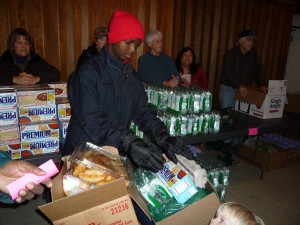It’s the time of year when many people start thinking more about others, and charitable opportunities abound. While it’s wonderful to participate in various charitable activities, it’s also a good time of year to reflect on the difference between charity and ableism and how our own holiday activities and “charitable” mindsets might be assessed within these categories, especially towards individuals on the spectrum. Many autistics are outspoken on the topic of autism and ableism, yet many parents are completely unfamiliar with the term.
Most People Don’t Know They Are Acting Ableist
Ableism is a type of discrimination or social prejudice towards disabled people. Ableism is rampant in the autism community as well as all kinds of disability communities. This form of discrimination is sometimes difficult for individuals to identify because it typically lies in the crevices of their minds, in subconscious thought, thus many people think they are doing good deeds even if ableism pervades that act. Lydia Brown, an autistic advocate and national speaker on disability rights has written about different examples of ableism on her blog. Ableist attitudes can be visible in a person’s language, such as when someone uses a slur (like “retarded”), but, this is only one type of ableist expression. Lydia points out that “Ableism is the systematic, institutional devaluing of bodies and minds deemed deviant, abnormal, defective, subhuman, less than.”
Ableist Charitable Giving
Ableism is also reflected in a person’s motives for charitable giving. Sometimes people can do good deeds with inappropriate intentions and patronizing attitudes that perpetually alienate autistic people. Thoughts that enter your mind as you donate to a particular cause or participate in a charitable event really are revealing and significant. Judy Endow, an autistic self-advocate, author, and speaker has blogged about this topic and outlined several examples of ableist and genuine charitable giving scenarios.
One example she gives is the opportunity to donate toys for needy families during Christmas time. An ableist donator might think, “It is good to give to poor children. It is not their fault their parents don’t know how to handle money or can’t keep a job.” On the other hand, a non-ableist donator might simply think, “It’s nice for all kids to have toys and gifts for Christmas.”
Judy asserts, “This means that the very same actions we muster up when helping the poor and disabled can come from a place of inclusion or from a place of ableism. One attitude shares joy and life, the other a crushes with a heavy unworthiness sometimes drawing out a smoldering anger in others.” As you consider your charitable giving opportunities this holiday season, reflect on your motives and thoughts as you participate to see if any ableism creeps to the surface.
Ableism and Autism: Patronizing Speech and Behavior
Autistic people tend to receive juvenile treatment at all ages. For example, people make assumptions about their inability to understand language or process language at typical speeds. It’s best to not assume what accommodations an autistic person needs, but rather ask them directly. Speaking slower or louder might not be the trick, so don’t assume it is.
Lydia Wayman, another autistic self-advocate and author has written about how she asks for “No patronization, just accommodation” on her blog Autistic Speaks. Her advice to parents is to speak to autistics as if they can hear and understand you and repeat if necessary. Don’t speak about them in front of them. There have been plenty of cases of autistic children who grow up to develop speech or communicate at later ages and have revealed how they understood what was being said about them during their earlier years. Assume competence and accommodate wherever they or a close caregiver has identified that they need it.
The Autistic Perspective
Sometimes people may spend “token time” with autistics as part of a school project, for research, or just to make them feel good about themselves. This isn’t real friendship, and your gesture probably won’t be well-received. Judy Endow wrote a fabulous blog post about how it feels to be on the receiving end of an act from “the goodness of your heart.” In short, don’t think that your good act is a form of heroism or saintliness, because not only may it not be genuine, your hidden ableism may be further alienating the disabled community.
Most people don’t think beyond the choice to do that one good act. They feel good about doing it and don’t feel committed to anything else. Many people also assume that whoever they are “helping” needed it and will be grateful. This isn’t always the case. See this thread from Wrong Planet (a popular forum for individuals on the spectrum) with discussions about what it feels like to be a charity case. Both experts and non-experts in the autism community can have patronizing attitudes toward autistics, and long-term exposure to this can have a lasting impact on their self-confidence.
You Don’t Get to Call Yourself an Ally
We must earnestly try to advocate for what is truly right and good. How do we know what that is? We don’t, for certain. However, it seems logical to gather as much information as possible to try and make this decision. We can’t call ourselves autistic allies unless we are aligned and advocating for what autistics want. Autistic people (all over the spectrum) are speaking and advocating for their needs, but people still only make decisions based on the opinions of doctors, therapists, or the latest treatment trend. It’s crucial to engage with the autistic community for insight into how you can meet the needs of autistics in your home and community. And if you think that you can’t seriously consider the opinion of someone who is autistic because their views are already skewed by virtue of being autistic, that’s a sign of a vibrant red ableist flag waving before your eyes.
Additional Reading About Autism and Ableism
http://www.judyendow.com/advocacy/helping-the-poor-and-disabled/
http://www.judyendow.com/advocacy/out-of-the-goodness-of-your-heart/
http://wrongplanet.net/forums/viewtopic.php?t=72728
http://www.autistichoya.com/2012/03/who-gets-to-be-ally.html
http://jewishaspie.blogspot.com/2014/11/patronizing-autistic-people-promotes.html
https://autisticspeaks.wordpress.com/2013/08/21/no-patronization-just-accommodation/

